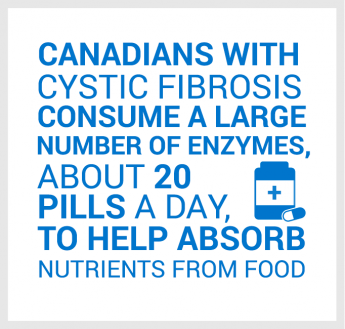Life-changing treatment, Trikafta, is coming to Canada
Innovative drug can treat up to 90% of Canadians Living with CF, with promise of transforming lives
TORONTO (November 9, 2020)– Today the cystic fibrosis story is significantly changing, with a long-awaited transformational therapy now in sight for Canadians living with the disease. Cystic Fibrosis Canada has received information that a decision has been made by the manufacturer to bring new CF medicines to Canada. We understand this to mean that an application to bring Trikafta to Canada is underway, however this will be confirmed when Health Canada shares the information on their website. This follows more than a year of tireless advocacy from the Canadian cystic fibrosis (CF) community, clinicians, Cystic Fibrosis Canada and its partners, all working together to call on the government and manufacturer to bring this innovative treatment to Canada. In a recent meeting with Cystic Fibrosis Canada, the Federal Minister of Health committed to fast track Trikafta through Health Canada for approval and for pricing review.
Cystic fibrosis is the most common fatal genetic disease affecting Canadian children and young adults. Of the Canadians with cystic fibrosis who died in 2018, half were under the age of 33. Clinical trial data has proven that Trikafta is the greatest innovation in the history of cystic fibrosis treatments with a transformational impact on recipients which includes longer and healthier lives. Canadian research released in August 2020 demonstrates that if Trikafta was brought to Canada quickly, as it has been in the United States, the United Kingdom and parts of Europe already, it could result in extraordinary health benefits by 2030, including 15% fewer deaths, 60% fewer people living with severe lung disease and an increased estimated median age of survival for a child born with cystic fibrosis of 9.2 years.
While Trikafta has been available for over a year in the United States, the manufacturer had not submitted an application to bring the drug to Canada, citing uncertainty caused by changes to the Patented Medicine Prices Review Board (PMPRB) guidelines that inform the regulation of patented drug pricing in Canada.
“This is an extraordinary moment of hope for people living with or impacted by cystic fibrosis in Canada, earned through the relentless work of our community. Thousands of letters have been sent, petitions and open letters signed, meetings held with MPs, personal stories bravely shared with the media, all creating a swell of urgency that could not be ignored. Thank you to everyone who helped make this possible,” says Kelly Grover, President and CEO of Cystic Fibrosis Canada.
Once a submission is completed and Trikafta is approved by Health Canada, it goes to the pan-Canadian Pharmaceutical Alliance (pCPA), through which the public drug programs negotiate a price with the manufacturer. Cystic Fibrosis Canada has called on the pCPA to work with the federal Minister so that Trikafta can move quickly and seamlessly from the review process to pricing negotiations. As the pCPA is currently negotiating pricing for Orkambi and Kalydeco, other therapies developed by the same manufacturer, Cystic Fibrosis Canada has called on the pCPA to negotiate Trikafta at the same time to expedite the process.
“We want to point out that this did not come as quickly as it should have and we lost members of our community in the process. We call on all levels of government to move this drug through the approval process quickly so people living with cystic fibrosis do not have to wait any longer,” says John Wallenburg, Chief Scientific Officer at Cystic Fibrosis Canada.
The news comes on the heels of extensive community advocacy by Cystic Fibrosis Canada, the community and other partner groups which has included over 5,500 letters being sent to 99% of Members of Parliament (MPs) in Canada, an open letter signed by 77 cystic fibrosis clinicians, 40,000 Canadians signing a petition to raise awareness of the failures in our drug reimbursement system when it comes to rare disease drugs, partnerships with other health charities to maximize awareness and countless meetings with MPs and the Federal Minister of Health.
-30-
About Cystic Fibrosis
Cystic fibrosis is the most common fatal genetic disease affecting Canadian children and young adults. There is no cure. Of the Canadians with cystic fibrosis who died in 2018, half were under the age of 33. Cystic fibrosis is a progressive, degenerative multi-system disease that affects mainly the lungs and digestive system. In the lungs, where the effects are most devastating, a build-up of thick mucus causes severe respiratory problems. Mucus and protein also build up in the digestive tract, making it difficult to digest and absorb nutrients from food. In addition to the physical effects of the disease, mental health concerns are emerging; anxiety and depression are common among this population. Double lung transplants are the final option for patients with end-stage disease; most fatalities of people with CF are due to lung disease.
Cystic Fibrosis Canada
Cystic Fibrosis Canada has dramatically changed the cystic fibrosis story. We have advanced research and care that has more than doubled life expectancy. Since being founded by parents in 1960, Cystic Fibrosis Canada has grown into a leading organization with a central role engaging people living with cystic fibrosis, parents and caregivers, volunteers, researchers and healthcare professionals, government and donors. We work together to change lives through treatments, research, information and support. Despite our remarkable progress together, we are not yet done. Not when a child with cystic fibrosis still has only a 50% chance of living to 52. We will keep pushing, keep going further until all people with cystic fibrosis can and do experience everything life has to offer — and enjoy everything life has to offer. Learn more at www.cysticfibrosis.ca
For more information, please contact:
Kenya Francis, Associate, Corporate Communications
Cystic Fibrosis Canada
Tel: 416-485-9149 ext. 203
Tel: 1-800-378-2233 ext. 203
Email: kfrancis@cysticfibrosis.ca



.png)
